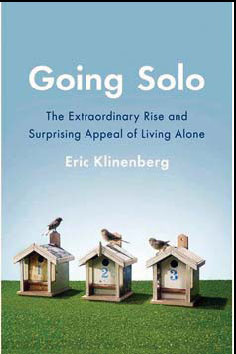
 'Taken 2' grabs movie box office crown
'Taken 2' grabs movie box office crown
 Rihanna's 'Diamonds' tops UK pop chart
Rihanna's 'Diamonds' tops UK pop chart
 Fans get look at vintage Rolling Stones
Fans get look at vintage Rolling Stones
 Celebrities attend Power of Women event
Celebrities attend Power of Women event
 Ang Lee breaks 'every rule' to make unlikely new Life of Pi film
Ang Lee breaks 'every rule' to make unlikely new Life of Pi film
 Rihanna almost thrown out of nightclub
Rihanna almost thrown out of nightclub
 'Dark Knight' wins weekend box office
'Dark Knight' wins weekend box office
 'Total Recall' stars gather in Beverly Hills
'Total Recall' stars gather in Beverly Hills
Going Solo, by Eric Klinenberg (Penguin Press)
Updated: 2012-02-14 11:19
(China Daily/Agencies)
|
||||||||

Living in families, though traditional and almost universal on this evolving planet, is experiencing an unplanned but effective attack, according to a new book.
Author Eric Klinenberg, professor of sociology at New York University, sees lessons to be learned. He sums them up in his subtitle: The Extraordinary Rise and Surprising Appeal of Living Alone.
What good is living alone? Isolate yourself from all your friends? No wife? No husband? No mother? And all that laundry to do? Babies? Maybe, later.
Klinenberg also collects interviews with older people who choose independent living rather than available alternatives as long as they can, though their stories are necessarily sadder than those of young people.
Though the short book is largely concerned with the United States, it devotes 10 vivid pages to solutions innovated in Sweden. Back in the 1930s social planner and Nobel Peace Prize winner Alva Myrdal opened a "collective house". It had 57 units for single women and single mothers, with a communal kitchen, a nursery and small elevator service to each unit for meal deliveries.
"Solitude, once we learn how to use it, does more than restore our personal energy," Klinenberg concludes. "It also sparks new ideas about how we might better live together."
Most Viewed
Editor's Picks

|

|

|

|

|

|
Today's Top News
Health new priority for quake zone
Xi meets US top military officer
Japan's boats driven out of Diaoyu
China mulls online shopping legislation
Bird flu death toll rises to 22
Putin appoints new ambassador to China
Japanese ships blocked from Diaoyu Islands
Inspired by Guan, more Chinese pick up golf
US Weekly

|

|






